Yarmouth Lifeboat Station
Yarmouth Lifeboat station (not to be confused with Great Yarmouth and Gorleston) is an RNLI[1] station located in the town of Yarmouth on the Isle of Wight in the United Kingdom.[2] The station has been based in Yarmouth's harbour since 1924. Previously the station had been in Totland Bay, west of Yarmouth, until it was decided that the station need a motor lifeboat. The current Severn-class lifeboat is moored afloat and shore facilities are on the quayside in Yarmouth. The station covers the western Solent with its all-weather lifeboat Eric and Susan Hiscock (Wanderer) (ON-1249) which has been on service at Yarmouth since 2001.[1]
| Yarmouth Lifeboat Station | |
|---|---|
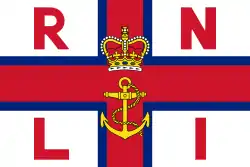 | |
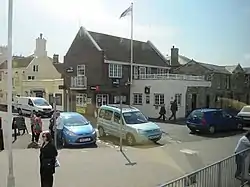 Yarmouth Lifeboat Station | |
 Location of Yarmouth Lifeboat station within Isle of Wight | |
| General information | |
| Type | RNLI Lifeboat Station |
| Location | The Boatshed, Quay Street, Yarmouth, Isle of Wight, PO41 0PQ |
| Country | England |
| Coordinates | 50°42′22.1″N 1°30′01.7″W |
| Opened | 1868–1870 and 1924 |
| Owner | Royal National Lifeboat Institution (RNLI) |
| Technical details | |
| Material | Masonry, Brick, Concrete |
Eric and Susan Hiscock (Wanderer)
Eric and Susan Hiscock (Wanderer) has a top speed of 25 knots (46 km/h) and a range of 250 nmi (460 km). She is operated by a crew of six and is fitted with the latest in navigation, location and communication equipment including electronic chart plotter, VHF radio with direction finder, radar and global positioning systems (GPS). The lifeboat has a displacement of 41 t (40 long tons) and carries a daughter Y-class which is launched and recovered by crane. Having the Y-class enables the crew to make rescues close to shore.
Station history
Totland Bay
The first established station to cover the western Solent dates from 1879[3] and was located west of Yarmouth in Totland Bay. To fund this service money was raised by the local Isle of Wight Sunday Schools Committee. The first lifeboat was Dove,[3] manned by local volunteers. In the first five years of the service the lifeboat and her crew proved to be a great success and over that period the lives of 36 people were saved when they were brought ashore. The record of this first lifeboat convinced the RNLI of the need and viability of formalising a service on this part of the Isle of Wight.[3] In 1884 funds were made available to build a lifeboat house and a new lifeboat was sent to the station. This lifeboat was called Charles Luckombe and she was a self-righting pulling lifeboat powered by 12 oars. She was 37 feet (11 m) in length and 8 feet (2.4 m) beam. She began service at Totland bay in 1885[4] Charles Luckombe was replaced in 1903 by Robert Fleming, funded in part by a memorial bequest of £1,000 made to the RNLI. The lifeboat was launched by Emily Seely, wife of John Edward Bernard Seely, the local Member of Parliament.[5]
Relocation to Yarmouth
In 1924[4] the RNLI decided that lifeboat cover for the western end of the Solent would be better served by a motor lifeboat. The Totland boathouse was closed and the station was moved to Yarmouth harbour, with service buildings onshore and the boats kept in the harbour.[4]
Motor Lifeboat
The first motor lifeboat at the new Yarmouth location was the Watson-class B.A.S.P. (ON-687).[6] The lifeboat, built by J. Samuel White, was also equipped with sails in case of engine failure. The lifeboat was named by His Royal Highness Edward the Prince of Wales. She was named B.A.S.P. after the donors, Blackburn, Armstrong, Smart and Price. During her ten years of service at the station, B.A.S.P. undertook 42 operations which saved 30 lives. After service at several other stations and in the Relief Fleet, she was sold in 1955. B.A.S.P. is now on display at as part of the Historic Lifeboat Collection at the maritime museum in Chatham. B.A.S.P. is entered in the National Historic Ships register and has the Certificate No: 1687.[6]
Inshore Lifeboat
In July 1964 the station established an inshore lifeboat service but this was permanently withdrawn in October 1978.[7]
Improvements
In 1988 the Institute made improvements to the onshore facilities for the station. They provided a kitchen, toilets and washrooms within the existing boatstore. In 1994 the RNLI purchased the Yarmouth Customs House on the quayside in Quay Street and began alterations to the building.[4] This work included creating crew changing rooms, workshop, toilet and showers, and an RNLI souvenir and retail outlet on the ground floor. An office, training room, and crew facilities were built on the first floor. In 2000 work was carried out in the harbour to improve the lifeboat berth.[7]
Notable rescues
Al Kwather 1
On 28 October 1989[4] the Arun-class Margaret Russell Fraser (ON-1108)[8] relief lifeboat was launched to service from Yarmouth with Coxswain David Kennett at the helm. The weather in the Solent was poor with a south westerly severe gale force 9 blowing. The roll-on/roll-off cargo vessel Al Kwather 1[9] was reported to be in difficulties three and a half miles east of Peveril Point near Swanage. Some of the ship's cargo of cars had broken loose on the deck. The Swanage Rother-class lifeboat Horace Clarkson (ON-1047)[10] had been on the scene since 11.30 am and in hurricane-force winds was standing by the vessel. At 3.10 pm the Margaret Russell Fraser arrived on the scene and took up a position astern of the Al Kwather 1 whilst the Swanage lifeboat returned to its station. The Al Kwather 1 appeared to be in no danger and so after an hour the Yarmouth boat also made for Swanage to allow the crew to get some rest and do initiate some minor repairs to the boat.[4] Just after midnight the captain of the Al Kwather 1 reported that his vessel had problems with its engines and requested help. Both lifeboats left Swanage with the Margaret Russell Fraser arriving first to find the ship in complete darkness and listing to port and rolling violently, broadside to the seas. The lifeboat used her searchlights on approaching the ship from the stern and with great skill, and a great deal of danger, manoeuvred alongside the ship and rescued two[4] of the crew who were hanging on to a cargo net they had clambered down. This proved to be very dangerous and one of the crew men rescued had fallen from the net. His foot had caught in the net and hanging below the deck of the lifeboat, the crew had managed to haul him to safety. News arrived that a helicopter was en route and it was used to rescue the remaining crewman from the ship.[4] The lifeboats then returned to their stations. Coxswain Kennett[11] was awarded an RNLI Bronze Medal for his part in the service. Assistant Mechanic Brian Miskin and crewman Joseph Lester were presented with framed letters. The Coxswain of the Swanage lifeboat, Christopher Haw was accorded the Thanks of the Institution on Vellum.[4]
Gallery
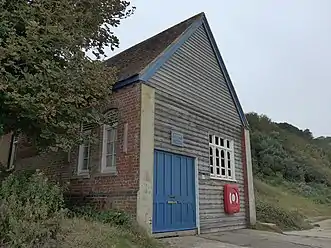 The old Boathouse at Totland Bay was demolished; this is actually H Simmonds' boatyard which was alongside the Lifeboat Station.
The old Boathouse at Totland Bay was demolished; this is actually H Simmonds' boatyard which was alongside the Lifeboat Station.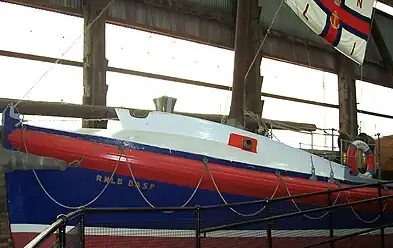 RNLB B.A.S.P. (ON-687) on display at the Historic Lifeboat Collection at Maritime museum in Chatham Dockyard
RNLB B.A.S.P. (ON-687) on display at the Historic Lifeboat Collection at Maritime museum in Chatham Dockyard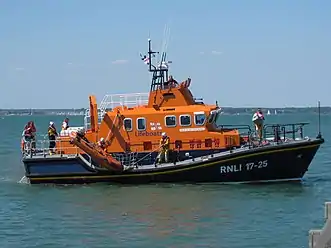 The current Yarmouth Severn-class lifeboat RNLI Eric and Susan Hiscock (Wanderer) (ON-1249) which has been in service at Yarmouth since 2001 to date (March 2014).
The current Yarmouth Severn-class lifeboat RNLI Eric and Susan Hiscock (Wanderer) (ON-1249) which has been in service at Yarmouth since 2001 to date (March 2014).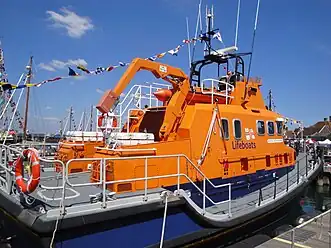 RNLI Eric and Susan Hiscock (Wanderer) (ON-1249)
RNLI Eric and Susan Hiscock (Wanderer) (ON-1249)
Neighbouring Station Locations
References
- "The RNLI Yarmouth Lifeboat Station website". Home page of station website – RNLI. 2014 RNLI. Retrieved 9 March 2014.
- OS Explorer Map OL29 – Isle of Wight, Folded Map. Publisher:Ordnance Survey; B2 edition (17 Mar 2008). ISBN 9780319240151
- "The Neddles Battery". The Rescuers – Details and description of Totland lifeboat. The Needles Battery 2004 – 2014. Archived from the original on 10 March 2014. Retrieved 27 January 2015.
- For Those in Peril – The Lifeboat Service of the United Kingdom and the Republic of Ireland, Station by Station. Author: Leach, Nicholas. Publisher: Silver Link Publishing Ltd, First Issue 1999. Work:Part 2, South Coast of England – Eastbourne to Weston-super-Mare, Page 79, Yarmouth, Isle of Wight. ISBN 1857941292
- "Friday 22 August 2003 – 100 Years Ago August 22, 1903". Reference to the launching of the Robert Fleming. Isle of Wight County Press 2011 – 2014. Retrieved 10 March 2014.
- "RNLB B.A.S.P." Details of the lifeboat on the historic Ship Register. The National Historic ships Register – The official voice of historic ships in the UK. Retrieved 10 March 2014.
- "Yarmouth Lifeboat Station: History". Royal National Lifeboat Institution. Retrieved 27 January 2015.
- "Arun-Class Lifeboats". List of Arun-class lifeboats, includes ON-1108. Lifeboat World On-Line 2014. Retrieved 11 March 2014.
- "Al Kwather 1 – IMO 6903400". Photograph and details of Al Kwather 1. Ship Spotting.com 2014. Retrieved 11 March 2014.
- "Rother-Class Lifeboats". List of Rother-class lifeboats, includes ON-1047. Lifeboat World On-Line 2014. Retrieved 11 March 2014.
- Lifeboat Gallantry – RNLI Medals and how they were won. Author: Cox, Barry. Publisher:Spink & son Ltd and the RNLI, 1998. Work: KENNETT David George, Coxswain, Yarmouth, Isle of Wight, Lifeboat: Page 390/391. ISBN 0907605893